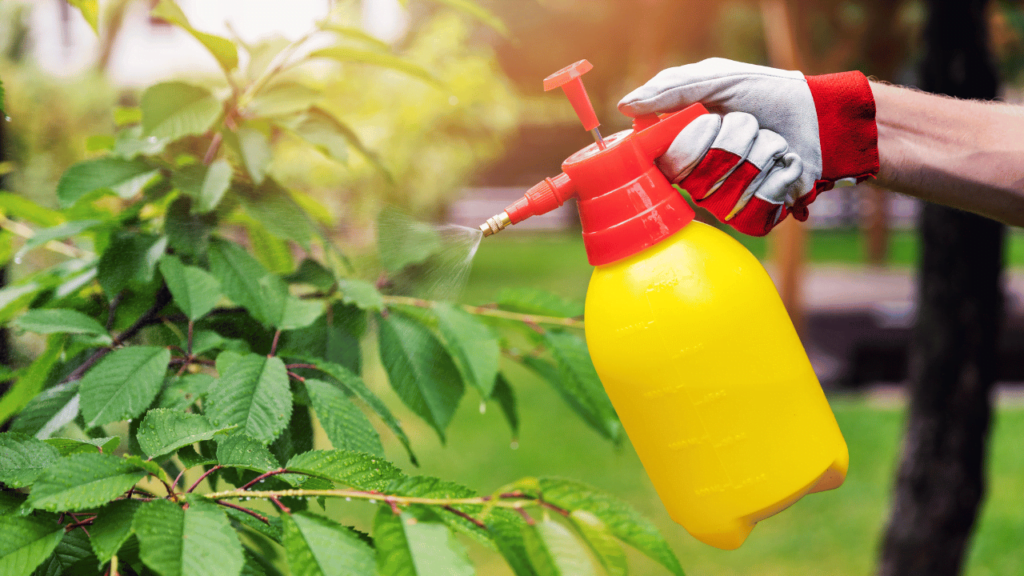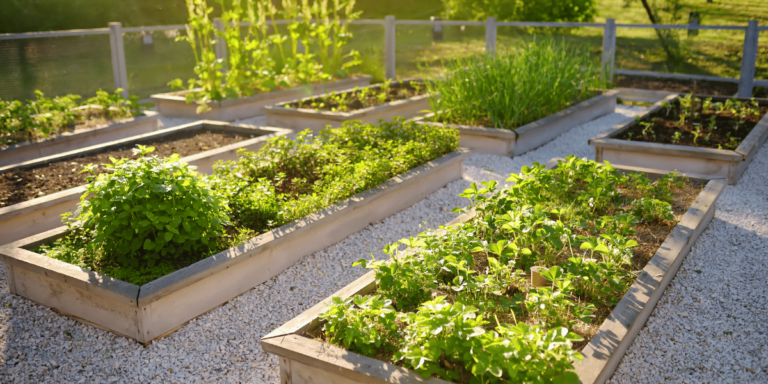Are you a passionate gardener looking for safe and effective methods to keep pests at bay while maintaining the health of your plants? Look no further! In this article, we will explore the world of organic garden pest solutions and how they can help you create a thriving garden ecosystem without the use of harmful chemicals.
Using organic and eco-friendly pest management methods is not only beneficial for your plants but also for the overall health of your garden. By adopting natural pest control strategies, you can target pests without harming beneficial organisms, avoid toxic chemicals, and reduce health risks for you and your family.
Chemical pesticides may offer quick results, but they can have detrimental effects on the environment. They can contaminate the soil and water, pose health risks to humans, and disrupt the natural balance and biodiversity of your garden. By opting for organic pest control methods, you contribute to the preservation of the ecosystem and promote sustainability.
Key Takeaways:
- Organic garden pest solutions provide a safe and effective way to manage pests.
- Using natural pest control methods helps maintain a balanced ecosystem and long-term plant health.
- Avoiding chemical pesticides reduces the risks to beneficial organisms and minimizes soil and water contamination.
- Organic pest control methods contribute to the overall sustainability of your garden.
- By implementing organic pest control strategies, you can create a thriving and eco-friendly garden space.
Why Natural Pest Control Matters
Using natural pest control methods in your garden is crucial for maintaining a balanced ecosystem and ensuring the long-term health and sustainability of your plants. Natural pest control offers several benefits, including:
- Promoting a Balanced Ecosystem: Natural pest control methods help maintain the delicate balance between pests, beneficial organisms, and plants. By targeting pests without harming beneficial organisms, such as bees and ladybugs, you can create a harmonious ecosystem that supports the growth and vitality of your garden.
- Minimizing Soil and Water Contamination: Chemical pesticides can seep into the soil and contaminate water sources, causing environmental harm. In contrast, natural pest control methods avoid the use of toxic chemicals, reducing the risk of soil and water pollution. This promotes the overall health of your garden and the surrounding environment.
- Reducing Health Risks: Chemical pesticides pose health risks to humans and other animals. Exposure to these toxins can lead to respiratory problems, skin irritations, and even more severe health issues. By opting for natural pest control methods, you can create a safer environment for everyone, including yourself, your family, and your pets.
- Maintaining Biodiversity and Natural Balance: Natural pest control methods help preserve the diverse range of organisms in your garden, including beneficial insects, birds, and reptiles. By avoiding the use of chemical pesticides, you allow these organisms to thrive, contributing to the natural balance and biodiversity of your garden.
- Promoting Sustainability: Embracing natural pest control practices aligns with a sustainable approach to gardening. By minimizing the use of synthetic chemicals, you prioritize the long-term health and wellbeing of your garden, as well as the broader ecosystem. Sustainability ensures that future generations can enjoy the beauty and benefits of gardening.
By implementing natural pest control methods, you can create a garden that promotes a balanced ecosystem, supports the long-term health of your plants, and contributes to overall sustainability. It’s a win-win for your garden and the environment.
| Advantages of Natural Pest Control | |
|---|---|
| Promotes a Balanced Ecosystem | ✔ |
| Minimizes Soil and Water Contamination | ✔ |
| Reduces Health Risks | ✔ |
| Maintains Biodiversity and Natural Balance | ✔ |
| Promotes Sustainability | ✔ |
Advantages of Natural and Organic Pest Control
Natural and organic pest control methods offer numerous advantages for your garden. These methods target pests without harming beneficial organisms, avoid toxic chemicals, pose fewer health risks, promote healthy soil and biodiversity, and contribute to overall sustainability.
One of the key advantages of natural pest control is its ability to target pests specifically, without causing harm to beneficial insects and organisms that play a vital role in maintaining a balanced ecosystem. By using organic pest control methods, you can protect pollinators like bees and butterflies, as well as beneficial insects like ladybugs and praying mantises, which naturally prey on garden pests.
Unlike chemical pesticides, natural pest control methods do not contain toxic chemicals that can be harmful to humans, pets, and the environment. This makes them a safer option for pest management, especially in gardens where children and pets may be present.
Another advantage of natural pest control is its positive impact on soil health. Chemical pesticides can harm the microbial communities in the soil, disrupting the nutrient cycle and organic matter decomposition processes. On the other hand, organic pest control methods promote healthy soil by preserving beneficial microorganisms and enhancing nutrient availability, leading to stronger and more resilient plants.
Natural pest control methods also support biodiversity in your garden. By avoiding the use of chemical pesticides, you create an environment that attracts a diverse range of beneficial organisms, such as birds, frogs, and beneficial insects. This biodiversity helps maintain a natural balance in the garden ecosystem, reducing the likelihood of pest outbreaks and promoting overall plant health.
Furthermore, natural and organic pest control methods contribute to the overall sustainability of your garden. By minimizing the use of synthetic chemicals, you reduce the risk of soil and water contamination. This not only protects the health of your plants but also ensures the long-term viability of the surrounding ecosystem.
By harnessing the advantages of natural and organic pest control, you can create a thriving and eco-friendly garden that supports the long-term health and productivity of your plants. Whether it’s using companion planting techniques, attracting beneficial insects, or implementing homemade organic pest control remedies, embracing natural methods of pest management will help your garden flourish.
Common Garden Pests to Control

When it comes to maintaining the health and productivity of your garden, understanding and effectively controlling common garden pests is crucial. By recognizing these pests and the damage they can cause, you can take prompt action to protect your plants and ensure a thriving garden. Here are some of the most common garden pests you should be aware of:
| Pest | Description | Damage to Plants |
|---|---|---|
| Aphids | Small insects that feed on plant sap | Curling leaves, stunted growth, honeydew residue |
| Spider Mites | Tiny arachnids that suck plant sap | Webbing, yellowed or speckled leaves, leaf drop |
| Japanese Beetles | Metallic green beetles with coppery wings | Skeletonized leaves, damaged flowers and fruit |
| Caterpillars | Larval stage of butterflies and moths | Chewed leaves, defoliation |
| Deer | Large herbivores that feed on plants | Browsing damage, missing foliage |
| Rabbits | Small mammals that graze on plants | Gnawed stems, damaged bark, nibbled leaves |
By familiarizing yourself with these common garden pests, you can identify them early on and take appropriate measures to control their populations. This will help prevent significant damage to your plants and ensure a healthy, thriving garden.
Stay tuned for the next section, where we will explore effective strategies for natural pest control in the garden.
Strategies for Natural Pest Control in the Garden

When it comes to controlling pests in your garden, employing natural strategies is both effective and environmentally friendly. By utilizing these natural pest control methods, you can protect your plants without resorting to harmful chemicals. Let’s explore some tried and tested strategies for natural pest control in the garden:
Crop Rotation and Intercropping
Crop rotation involves changing the location of different plant species each growing season. This disrupts the life cycles of pests, making it harder for them to establish themselves in your garden. Intercropping, on the other hand, involves planting complementary crops together to confuse and deter pests. For example, combining plants with strong scents or pest-repellent qualities can help keep unwanted insects at bay.
Maintaining Soil Health
A healthy and nourished soil forms the foundation of a thriving garden ecosystem. By enriching your soil with organic matter, compost, and natural fertilizers, you can enhance the overall health and vitality of your plants. Healthy plants are better equipped to resist pests and diseases, reducing the need for chemical interventions.
Attracting Beneficial Insects and Natural Predators
Beneficial insects, such as ladybugs, lacewings, and praying mantises, are natural predators of garden pests. By creating habitats that attract these helpful creatures, such as planting flowers that provide nectar and shelter, you can encourage their presence in your garden. These beneficial insects will help keep populations of harmful pests in check.
Practicing Companion Planting
Companion planting involves strategically pairing plants that benefit each other when grown in close proximity. For instance, planting marigolds alongside vegetables can repel aphids, nematodes, and other pests. Similarly, herbs like basil and mint can deter insects and attract pollinators. By utilizing companion planting techniques, you can maximize the health and resilience of your garden.
Using Organic Pest Control Remedies
When pests become problematic, there are several organic pest control remedies you can try. Insecticidal soaps, made from natural ingredients, can be effective against soft-bodied insects like aphids and spider mites. Neem oil, derived from the neem tree, acts as a natural insect repellent. Garlic and chili pepper-based sprays can also be used to repel pests. These remedies provide a safe and eco-friendly alternative to chemical pesticides.
Implementing these natural pest control strategies in your garden will not only protect your plants but also contribute to the overall health and sustainability of your ecosystem. By promoting beneficial insects, maintaining soil health, and utilizing organic remedies, you can create a harmonious and thriving garden environment.
Hand-Picking and Observation as Pest Control Methods
When it comes to organic pest control, hand-picking and observation are techniques that can play a vital role in safeguarding your garden. By physically removing pests from your plants and closely monitoring their behavior, you can effectively reduce infestation and protect beneficial insects. This method allows for targeted pest control, minimizing the need for chemical interventions that may harm the environment.
Hand-Picking Pests
Hand-picking involves manually removing pests from your plants using gloves or tweezers. This method is particularly effective for larger pests such as caterpillars, slugs, or beetles that can easily be spotted and collected. By regularly inspecting your plants, especially the undersides of leaves and the areas near buds and flowers, you can identify and eliminate pests before they cause significant damage.
Observation and Vigilance
Observation is key to understanding the behavior and life cycles of pests in your garden. By closely monitoring your plants, you can detect early signs of pest activity and take immediate action. Look out for chewed leaves, holes, or wilting foliage, which often indicate the presence of pests. Additionally, keep an eye on the population of beneficial insects, as their presence can help control pest populations naturally.
By practicing regular observation and vigilance, you can identify pests before they become a major problem. This proactive approach allows you to intervene early, reducing the need for more intensive pest control methods.
Protecting Beneficial Insects
One of the advantages of hand-picking and observation as pest control methods is that they do not harm beneficial insects. Beneficial insects, such as ladybugs, lacewings, and bees, play a crucial role in maintaining a balanced ecosystem by preying on garden pests. By avoiding the use of chemical pesticides, you preserve the population of these natural predators, allowing them to continue their work in keeping pest populations in check.
Furthermore, hand-picking and observation techniques enable you to target specific pests while sparing beneficial insects. This precision approach ensures that your garden remains in harmony with nature, promoting a healthy and thriving environment.
In the next section, we will cover another effective strategy for natural pest control in the garden: attracting beneficial insects. By creating a habitat that encourages these helpers, you can bolster your garden’s defense against pests.
Conclusion
Organic garden pest solutions and natural pest control methods offer a safe and effective way to protect your plants while maintaining a balanced ecosystem in your garden. By utilizing eco-friendly methods, you can ensure the long-term health of your plants and promote sustainability.
Implementing strategies such as crop rotation, which disrupts pests’ life cycles, and maintaining soil health are key to preventing pest infestations. Attracting beneficial insects to your garden is another effective way to control pests naturally, as they act as natural predators. Additionally, using homemade organic pest control remedies, such as insecticidal soaps and garlic and chili pepper-based repellents, can help eliminate pests without harsh chemicals.
By embracing organic garden pest solutions and natural pest control methods, you create a thriving and eco-friendly garden space that supports the overall health and productivity of your plants. Taking a proactive approach to pest management not only avoids harmful effects on beneficial organisms but also contributes to the sustainability of your garden. Embrace these eco-friendly methods, and watch your garden flourish while maintaining a healthy environment for all.
FAQ
Why is natural pest control important for my garden?
Natural pest control methods help maintain a balanced ecosystem, promote long-term health, and provide overall sustainability for your garden. By avoiding harmful chemicals, you can also protect beneficial organisms and reduce health risks.
What are the advantages of natural and organic pest control?
Natural and organic pest control offers numerous benefits, including targeting pests without harming beneficial organisms, avoiding toxic chemicals, minimizing health risks, promoting healthy soil and biodiversity, and contributing to overall sustainability.
Which common garden pests should I be aware of and control?
Common garden pests include aphids, spider mites, Japanese beetles, caterpillars, deer, and rabbits. Recognizing these pests and their damage allows you to implement effective pest control methods.
What strategies can I use for natural pest control in my garden?
Effective strategies for natural pest control include crop rotation, intercropping, maintaining soil health, using pest-resistant plant varieties, attracting beneficial insects and natural predators, practicing companion planting, and utilizing organic pest control remedies.
How can hand-picking and observation help control pests in my garden?
Hand-picking garden pests and closely observing their behavior is an effective organic pest control method. By physically removing pests and monitoring their activity, you can minimize the need for chemical intervention and protect beneficial insects.
Why should I choose organic garden pest solutions?
Organic garden pest solutions are safe for your plants and promote a balanced ecosystem and the long-term health of your garden. By implementing natural pest control methods, you can create a thriving and eco-friendly garden space.










